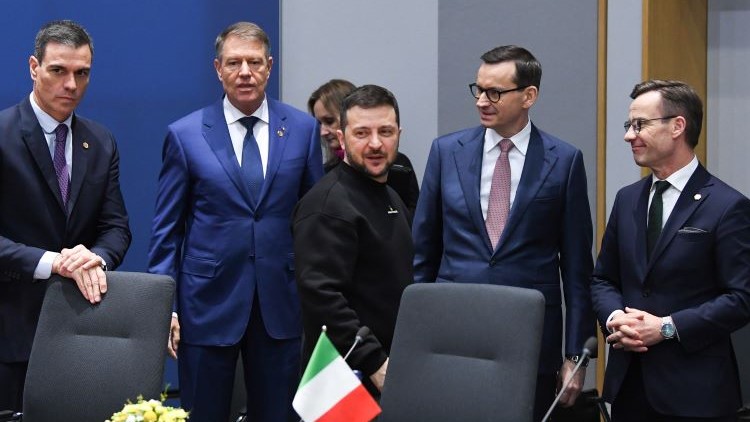The Diplomat
The 6th CELAC-EU Media Editors’ Congress yesterday approved the Madrid Declaration, which will be forwarded to the European Commission and the European Parliament, calling on lawmakers to “carefully and thoroughly examine” the Media Freedom Act draft before it is passed.
The Declaration underlines the journalists’ fear that “any interference by national and EU legislators in the editorial autonomy of media owners would jeopardise the independence and diversity of information“. And they recall that “the right to define, maintain, change and realise the trend of a publication is a consequence of the protected freedom of the press”.
The text also “unreservedly and firmly condemns the invasion and war in Ukraine and its devastating human and global economic consequences”.
The document, signed in Casa América by almost 40 journalists from European and Latin American media, “shows its total solidarity with every citizen affected and especially with the colleagues and media who carry out their work from the places of conflict” while “requesting the protection of journalists in the exercise of their profession in order to guarantee the right to responsible information for citizens, far from hate speech and discrimination”.
The Declaration pays tribute to colleagues killed or injured in the exercise of their profession and recalls Andrzej Poczobut, journalist of Gazeta Wyborcza, sentenced in Belarus to 8 years in prison for “inciting hatred” and “rehabilitating Nazism” in a closed trial. The text also denounces “the terrible conditions in which the journalistic profession is exercised in Mexico, with constant threats and repeated murders of journalists by organised crime”.
Javier Ramos, rector of the Rey Juan Carlos University, opened the last session of the Congress in the Carlos III Royal Coliseum in San Lorenzo de El Escorial, pointing out that universities must “make sure to instil (future journalists) with the values and knowledge that society and newsrooms need”, since the academic institution has the responsibility to train new communicators, as well as computer scientists and specialists in artificial intelligence, who will do all the technical work for the media to connect with their readers.
The first panel of the morning, which focused on “Educate, inform, entertain. The permanent“, featured interventions by Iary Gómez, general manager of Diario Grupo Extra in Costa Rica; Roberto Dias, editorial director of Grupo Folha in Brazil; Rita Fatiguso, international editor of Il Sole 24 Ore in Italy; and Pedro Araujo, executive editor of Jornal de Noticias in Portugal.
During the debate, the role of the journalist was highlighted as the most suitable professional to channel information, subject to demanding codes of ethics, as opposed to other forms of communication, such as those based on social networks. Although these contributions are respectable in many cases, in a high percentage of cases they cannot be considered as guaranteeing the informative rigour required to inform a democratic society truthfully.
The second panel, “The future, communicating without communicating. Artificial intelligence and communication“, brought together Rita Vásquez, director of La Prensa de Panamá; Eduardo Ordax, EMEA Principal Machine Learning Lead at AWS; Manuel Gertrudix, professor of Digital Communication at the Universidad Rey Juan Carlos and coordinator of the research group Ciberimaginario; and Juanjo de Santiago, Marketing Director of Grupo Prestomedia.
During this round table, the speakers helped to understand what Artificial Intelligence is and how to coexist with it, since “journalism has changed and we must train the new generations so that they are prepared for this new world“, in the words of Manuel Gertrudix.
All the speakers agreed that “artificial intelligence is here to stay” and that we must take advantage of the tools it offers to improve media websites and facilitate their connection with readers, for example, by creating precise profiles of their news interests. However, as Rita Vásquez pointed out, “this is useless if journalists do not offer quality content”.
In the third debate held at the Real Coliseo Carlos III, the president of the CEOE’s Tourism Council and corporate director of Iberia, Juan Cierco, underlined the Spanish airline’s commitment to reducing CO2 emissions, for which it is promoting the use of sustainable aviation fuel (SAF).
Cierco said that Iberia has already operated some flights with this new biofuel, whose only problem is that it is more expensive to produce than fossil fuels. For this reason, he called on Europe to provide aid for its production in order to compete with other countries, such as the United States, which are ahead in the development of PAS.
In a final speech, the Ambassador on Special Mission for Hybrid Threats and Cybersecurity, Nicolás Pascual de la Parte, analysed the technological development models of the three great world powers, stressing that the Chinese model is focused on control and centralisation of technological developments; the American model seeks quick profit; and the European model puts the human being at the centre, although “it lacks size, muscle and power”.
Nevertheless, he assured that “it is important for Europe to support its model and export it to other international actors, such as Latin America”. In short, “in a global geostrategic framework, full of uncertainties, Europe must be a decisive actor with its own voice and autonomy”, he concluded. He also referred to disinformation, which “can be a threat to democracy”, especially because “it is very difficult for the truth to prevail and very easy to believe a lie”.
At the closing dinner, the president of the Autonomous Community of Madrid, Isabel Díaz Ayuso, stressed the responsibility of editors and independent journalists in the defence of freedom and gave as an example the “pressures” on the media so that they would not “freely” report the consequences of the so-called ‘Only Yes is Yes’ Law, which she described as “disastrous”.
After pointing out that, despite everything, journalists “have been able to fulfil their objective”, informing public opinion “day by day of the number of sex offenders who have benefited”, he stressed: “This freedom of expression, this professionalism of the media has contributed to a government that has finally taken a wrong decision to modify this policy”.






